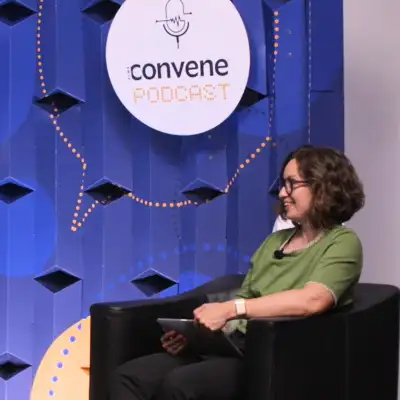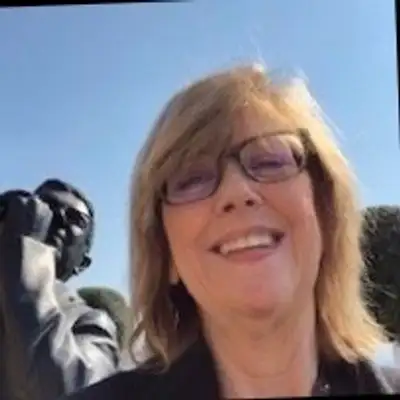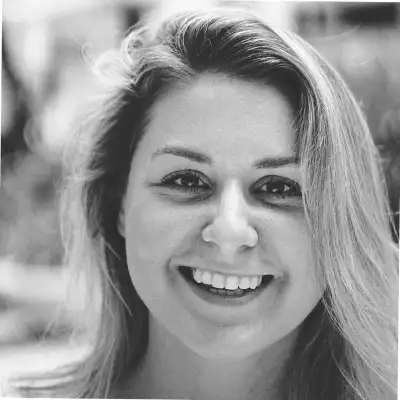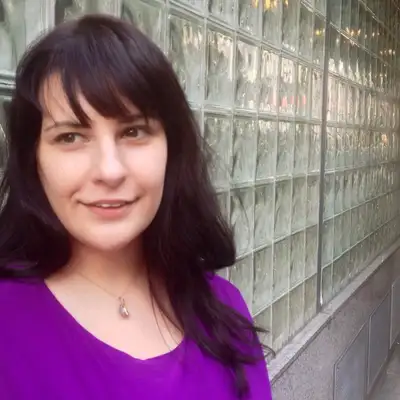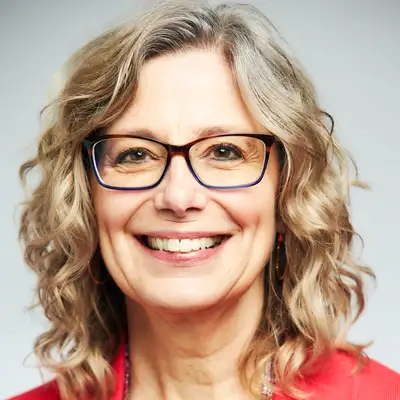Creators and Guests
What is PCMA Convene Podcast?
Since 1986, Convene has been delivering award-winning content that helps event professionals plan and execute innovative and successful events. Join the Convene editors as we dive into the latest topics of interest to — and some flying under the radar of — the business events community.
Convene Talk, ep. 79/Sept 19, 2025
*Note: the transcript is AI generated, excuse typos and inaccuracies
Magdalina Atanassova: This is the Convene podcast. It's time for another Convene talk. Barbara, take it away.
Barbara Palmer: Thanks, Maggie.
Okay, the story that really caught my eye this week,
it was published in Forbes by Sarah Hernholm.
And the the title is Stop Rushing Business Benefits of the Bbleisure Boom.
And I think there's just a stunning statistic in the very beginning of the story saying that bleisure travel has exploded from $175 billion in 2024 to more than 800 billion in 2025,
and that quadrupled in a year.
And the author points out that that's not gradual adoption. It's proof of a fundamental change in how people work.
And the main point that the story was making is the.
Is the benefits of adding space inside of business trips.
Trips are kind of maximized for efficiency and pack as much as you can into this trip.
Get in, get out as quick as possible.
And that is the opposite of what's needed to really nourish the kinds of thinking that leads to breakthroughs.
I want to mention a couple of other,
I think, really interesting statistics in this article. It said that more than half of Gen Z say that they get their best ideas away from their desks.
And then 83% of business travel travelers said that work travel is enjoyable.
And, you know, this reminded me of, I did a story a few months ago about, and this was based. Based on just the neuroscience behind breakthrough aha. Moments.
And it was just precisely what this article was talking about.
It's that when you kind of shift your gears from really focused thinking, where you're grinding away on what you are, you know, the work in front of you,
and you have a chance to step back and maybe change your environment,
let go of your grasp of what you're trying to get done,
then your brain is able to kind of subconsciously,
it just triggers connections in your brain. And I guess I was, I meant to go look this up, but I'm wondering about like,
you know, like the famous story about the apple hitting Isaac Newton on the head.
I just wonder,
was he actually lying underneath the apple tree and that's why it hit him on the head?
And I think that it's relevant to business travel, but it's also,
I think, extremely relevant to how we do conferences.
If you go to a conference and you kind of think, oh, it's new ideas someplace new, but what you're doing is you're packed. You know, you're like sitting in rows,
you're looking up at a panel,
just going down the list that's not an environment that's going to nurture flourishing of thought.
And Jen the Nomad,
I'm very eager to hear what you have to say about this.
Jennifer N. Dienst: Thanks, Barbara. I mean, I agree wholeheartedly with the point of the article. Like I for years and I've taken work trips I now tack, even if it's a fam where it's kind of already a set itinerary, I still ask to push my flights by a couple of days so that I can have time and wiggle room to explore and do the things I want to do and give that kind of like white space through the itinerary.
And I think it's so beneficial. And now I won't go on a trip without doing that.
And I think the same thing applies to conferences. I, I wholeheartedly agree.
However few issues with the article author messed up that statistic. I actually went. Cause I was like, there's something wrong about that number.
Barbara Palmer: Yeah, the quadruple.
Jennifer N. Dienst: Yeah, it didn't quadruple.
Barbara Palmer: So if you kind of begged belief. Right, right.
Jennifer N. Dienst: It's a little ridiculous.
So I clicked on the study and it, it, I think what she happened is she looked at the,
the first at the U.S. number and then saw the global number and somehow switch them. So what it actually is. And it's still a big jump. So to be fair,
it's not moot.
So the US bleisure travel market projected to increase from 1 74.5 billion in 2024 to a little over 205 billion. So if you click on the link, the hyperlink there, it shows.
Kate Mulcrone: Yeah.
Jennifer N. Dienst: And that 800 number I think refers to global. So I think that's, that's what happened there.
However, that's still a big jump. That's still 25.
No, that's 30 billion.
That it jumped. That it will jump.
Barbara Palmer: It is jump. Yeah.
Jennifer N. Dienst: Yeah. So still like a sizable. I don't know what percentage that is because I have the math skills of a four year old. But I thought it was interesting. Some of the examples that she named at the bottom like Naples, Florida.
And I was like,
okay,
I'm a Floridian,
right. So I'm kind of like these are, these are interesting. Naples is a cool place. Love it. It's beautiful. It's not the first place I think of when I come to business travel,
but okay. To each their own.
But again, I agree with the whole premise of the article. I think that the more you, you do that, you know,
the more beneficial it is. And, and like you were pointing out the More you're. You're going to gain from that.
So, Michelle, what are you thinking?
Michelle Russell: Well, I sort of agree with you about the.
She picked three cities and they seemed random to me. So one was Naples,
the other was New York City, and the other was Fort Myers, Florida. And I don't know where she. How she picked those,
but that seemed, like I said, random. But what I really responded to is the same thing all of us have been talking about, which is that she really had insight into how your brain works and why this makes sense.
And I remember talking to a neuroscientist years ago who said that when you're outside of your normal environment,
it forces your brain to travel new neural pathways and so you experiencing things differently,
which I was reminded of. I spoke with one of the organizers for the Creative Bureaucracy Festival in Berlin this week,
and it was amazing to me when I asked her, like, what is the design principle for a festival? And she said,
anything that's different from being in an office where these people are,
you know,
they work in an office and they're bureaucrats. So that's like the epitome of being in a kind of gray environment.
So anything that's different. And one of the things that she shared with me, which I thought was such a great idea, is when they were traveling from one end of the campus for the festival to another,
there were these pathways, which last year they held at the same place, and there's construction going on.
So there are these like,
scaffolding and fencing,
which they just, like, ignored last year. And then they thought, this year, let's make that an opportunity for people to engage. So they put up these,
like, signs and they said, what's your biggest challenge? And they had these big bubbles and people could put a stick it a sticky note on the things that they're most concerned about with their job.
And initially she said they were all concerned, like, oh, if nobody engages, we're going to have to go in there as staff and add things ourselves. But she said that it got to the point people were so invested in that that it caused almost a traffic jam. So it's just this way of, like.
Thinking about how people travel and just ways to engage with them and the fact that their mind just opens up when they're not in their normal environment.
Barbara, what do you think?
Barbara Palmer: You know, I also agree that those were random examples in the story, but I also, what I thought about it is like,
yes to all of it, because in the story that I wrote with the neuroscientists, Talking about new ideas.
They talked about this researcher that solved a problem at the grocery store.
It's like, it doesn't have to be exotic.
And it made me think about how when you talk about a change to work and a change we to meetings, like, what about like a change in how our day, you know, our daily routines,
I mean, I feel like, I think a lot of,
maybe a lot of this burst in bleisure is a reaction against the sameness of remote work.
I, I, Somebody on Instagram interviewed Simon Sinek and he was talking about how we've lost these spaces where we zoned out, where you sat on the subway and just like, you know,
stared at the poster for 10 minutes or you,
you know, stood in line and when everything is like,
open your, open your laptop,
interact with.
Did you know,
bits and bytes all day,
that, that can kind of gray things out a little bit. Kate,
please jump in.
Kate Mulcrone: I completely agree with what you're saying. And what really stuck out for me specifically with this article is the author wrote,
companies spend thousands on travel to expose their teams to new markets and ideas,
then structure the trips to prevent any absolute absorption of what they're experiencing.
And I think what this comes back to is the problem of needing to show roi,
but that you cannot measure the kind of spontaneous thinking that happens because it's the whole point for the meeting itself.
The meeting is the setting for your team to be exposed to fresh perspectives.
But if you could just create these perspectives in the office,
you wouldn't need to have a meeting.
And so I think that bleisure,
it's the same sort of thing.
Well,
I can't prove that there's any ROI to my vacation,
but if I just tack it onto this business trip, no one is going to give me any hassle about it and it maximizes like the time my brain gets a break.
Maggie, what do you think?
Magdalina Atanassova: I agree completely.
And I just wanted to get back to Michelle's point on the engagement with these sticky notes. I believe there's another thing at play. People just like to be heard. And this was a great opportunity for them to be exposing the issues in a way that, and they could also see who else had issues.
Maybe the sticky notes were anonymous, but then you could see the traffic and the people who were in and out. So I can understand that side of things as well.
And in terms of the article and the fact that we just need this moment of serendipity and random connections in this time for our brain to actually connect the dots that we are making, there's another point of slowing down and not rushing because business trips can be really fast and really exhausting.
I've done this just once and I said never again.
I had to go to Brussels from Bulgaria for a day.
And even though it's not such a long distance away, I still had a stopover in Europe. So that made four flights in a day.
I had to leave super early in the morning and I got very, very late at night. And I had eight hours of meetings with a working lunch in between with the same people.
I was in the same room for these eight hours.
And when I arrived back home and I got into the cab and I had to go home, the taxi driver asked me where to and I said, I have no idea at this point.
Just drive,
just drive out. Try to gather my,
my thoughts in a language that you would understand and I'll give you an address.
I was just dead and I said never again.
This just costed too much in and good. I was in my 20s and I could, you know,
keep up, survive on coffee and bad catering, but it's just slowing down, not doing those things. And I know that covet killed most of such, you know, pointless meetings for a day,
but it's really getting this time to explore the city because while you walk, you randomly connect the dots of what you've talked about with your colleagues. And I just love that.
And there was something else that was interesting about the younger generation.
53% getting better ideas so their best ideas at work.
So if those young people are really,
it is such a high number, I hope they'll naturally change the way in the industry works and those business trips work. And that would be more like,
we just need a downtime, we need this space. Give us the space, give us the opportunity to explore. And also it's more cost effective also for the planet and the footprint that we live.
Because you don't have to travel back to the destinations, you can just stay an extra day or two. And that's just wonderful.
Barbara Palmer: Barbara, we I noticed that discrepancy too,
that, you know, that the number of younger people was so much higher.
And what I attribute it to is the younger generation saying that that's what they need. I feel like, you know, older workers were kind of trained.
Like I know that I would always, I would,
I would tack on a day on trips,
but only if it involved a weekend because I thought, well, I'm already out of the office, I gotta get back.
But those days that I would tack on, I typically go to whatever art museum is there. Cause I feel like that's just such a window into the culture and they're usually very beautiful spaces and I love the art,
but you know, when I think back, I just how like I felt like I was like, oh yeah, I wholeheartedly agree with you. I hope that this,
this acknowledgement of, of what's needed to support innovative thought that is embraced by Gen Z will make a change.
I agree completely.
Magdalina Atanassova: But you know, it's also the younger generations and the younger people don't have families that they have to get back to. They don't have young children that they have to get back to and take care of.
So I get it. They have the opportunity to do that as well. While, you know, people with families and a lot of responsibilities, sometimes they just can't do it. So I get that because, you know, there's a lot of companies advertising how much travel there is to the attached to this position and that attracts a lot of people,
especially a lot of young people. So.
But again, it's for specific type of person. It's not for everyone.
And I saw by the way, I fed the article to AI and I just want to see what conclusion would it make.
And he said that the article positions pleasure not as an indulgence, but as a strategic investment in market knowledge and creative thinking. And I thought,
good job, AI.
Barbara Palmer: Good job. And good job, Jen. Thank you for. Thank you for putting us on the correct.
Magdalina Atanassova: Yeah.
Jennifer N. Dienst: Did AI catch the many errors?
Magdalina Atanassova: No, it did not.
Barbara Palmer: Here's what I love is that this really to me is like the permission slip. You really shouldn't need to use your brain, like find the environments and the kind of, you know, understand what your brain needs and kind of have the courage to give it what it needs.
Magdalina Atanassova: Yeah. Awesome. Love that. Thank you for the conversation.
Remember to subscribe to the Convene podcast on your favorite listening platform to stay updated with our latest episodes.
For further industry insights from the Convene team,
head over to pcma.org convene.
My name is Maggie.
Stay inspired,
keep inspiring, and until next time.
Remember to subscribe to the Convene Podcast on your favorite listening platform to stay updated with our latest episodes. For further industry insights from the Convene team, head over to PCMA.org/convene. My name is Maggie. Stay inspired. Keep inspiring. And until next time.
